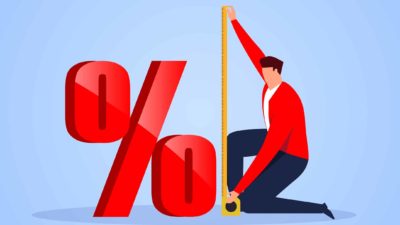Rising inflation, historically, hasn't spelled good news for ASX share prices.
That's because when inflation goes up, central banks tend to raise interest rates. And when the cost of money goes up, less gets borrowed and more gets parked in savings accounts. Or it finds its way into bonds, since yields increase when interest rates rise.
That usually spells slower growth for share markets.
Just look at the meagre performance of share prices in the United States and Australia in the latter half of the 1970s when both nations saw inflation spike towards 15%. That ushered in large increases in interest rates to drive inflation down.
But over in the US, Federal Reserve chair Jerome Powell just moved the goal posts.
More reasons to be long-term bullish on ASX share prices
Yesterday, overnight Aussie time, Powell addressed the Economic Policy Symposium in Jackson Hole, Wyoming. To paraphrase, he modified the Fed's policy of targeting a 2% annual inflation rate to one that will pursue an average rate of 2% 'over time'.
Since US inflation has been below 2% for much of the past decade, Powell has opened the door to accepting higher inflation without raising interest rates.
Now the figures they're throwing around are inflation rates of 2.5% or perhaps 3% – nothing like what we experienced in the 70s. And indeed, those figures are in line with the Reserve Bank of Australia's own inflation target of 2-3%.
But that's still great news for US and ASX share prices.
Why?
Because Australia's latest quarterly inflation figures came in at -0.3%. Which gives our government and the RBA plenty of wiggle room to continue their accommodating fiscal and monetary policies before needing to hike interest rates.
And the US is now prepared to keep interest low in the face of inflation rising above its target range. All this while both governments (and most governments across the globe) are pouring trillions of dollars into their economies, much of which will continue to find its way into the share markets.
Looking ahead
Now it's certainly possible (likely even, I'd say) that somewhere down the road inflation will rise significantly higher than 3%. That would see central banks eventually hiking rates again. But it's hard to envision that happening any time soon.
In the meantime, gradually higher inflation with no move in nominal interest rates means the real (inflation adjusted) rates for cash and debt will go even lower. Negative even. And there's nothing share markets like more than an abundance of easy money.
Indeed, the S&P 500 Index (INDEXSP: .INX) and the Dow Jones Industrial Average (INDEXDJX: .DJI) posted gains yesterday. Though the Nasdaq Composite (INDEXNASDAQ: .IXIC) gave back some its record new highs from the previous days.
So what about the ASX?
Well, ASX shares are losing ground today as well, with the S&P/ASX 200 Index (ASX: XJO) down 0.8% in late morning trade.
But these are daily moves. And a few big losses from stocks like the Appen Ltd (ASX: APX) share price down 8.9%, and the Regis Resources Limited (ASX: RRL) share price down 4.4% are offsetting the day's big gainers, like the Costa Group Holdings Ltd (ASX: CGC) share price up 8.5%.
With a mid to longer-term view (1-2 years), the low interest rate environment coupled with record government stimulus should see ever more money find its way into the share markets.
Cover your ASX shorts!
That message appears to be gaining traction with short-sellers. Those are investors who bet against share price gains, so they lose money when share prices rise.
According to data compiled by Bloomberg and the Australian Securities and Investments Commission (ASIC), the total weighted short interest on the ASX 200 yesterday stood at 1.67%. That's the lowest percentage of bets against share price gains since November 2017. And it's down 25% since the COVID-19 driven market rout.
Commenting on the data, Jun Bei Liu, a portfolio manager at Tribeca Investment Partners Pty, said:
Earnings expectations have been very low for some sectors so there was risk management heading into the reporting season, and so far we have seen quite a few big moves to cover shorts when results weren't as bad as expected.
Not surprisingly, health care shares rank among the least shorted.
As for the most shorted, Bloomberg data ranks Webjet Limited (ASX: WEB) number one, at 14.95%. Corporate Travel Management Ltd (ASX: CTD) comes in a close second at 12.3%.
Both shares have already been hit hard by the shutdown in global and domestic travel. And while they could go lower from here, I believe longer-term, both should see strong share price gains as borders reopen and people begin flying again.









